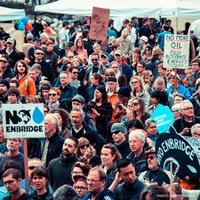
Like more than two-thirds of British Columbians and 130 First Nations, I’m outraged that the federal government wants to proceed with the Enbridge Northern Gateway twinned pipeline. In approving it, the government is aggressively pushing an unwanted project on an unwilling public. I don’t believe it will be built.
British Columbia and Canada have too much to lose: rich coastal ecosystems known as the Galapagos of the North, the vast Great Bear Rainforest, vibrant First Nations’ communities and some of the world’s last healthy salmon streams, among other treasures. B.C.’s communities are built on the understanding that healthy ecosystems lead to prosperity.
All this is at risk from a pipeline that will carry heavy oil across nearly 800 rivers and streams and onto supertankers travelling B.C.’s coastal waters. It’s hard to imagine a riskier project.
Yet Prime Minister Stephen Harper decided to approve the Enbridge Northern Gateway heavy oil pipeline despite a mounting outcry from Canadians.
This is not the time to increase our reliance on dirty fossil fuels. Building the Northern Gateway pipeline is out of step with what an overwhelming body of scientific evidence is telling us: We need to eliminate greenhouse gas emissions over the next several decades if we hope to guard against the worst impacts of climate change.
We can do better. The oil sands represent the fastest-growing source of carbon emissions in the country. Instead of supporting their unfettered expansion, we should be investing in a renewable-energy future that eliminates our dependence on fossil fuels. Building the Northern Gateway pipeline only ensures that emissions from the oil sands will continue to grow and Canada will again fail to be part of the solution to global warming.
I’m not giving up on a clean energy future for my children and grandchildren.
British Columbians say they don’t want this pipeline. Increased tanker traffic and the possibility of heavy oil spills threaten the same marine areas that the province, First Nations and local communities are working to protect through marine plans.
This conversation is far from over. Next steps will likely include court challenges and actions by Canadians and First Nations, whose concerns have so far been ignored. I urge you to remain hopeful and join me to make your voice heard for a responsible energy future.